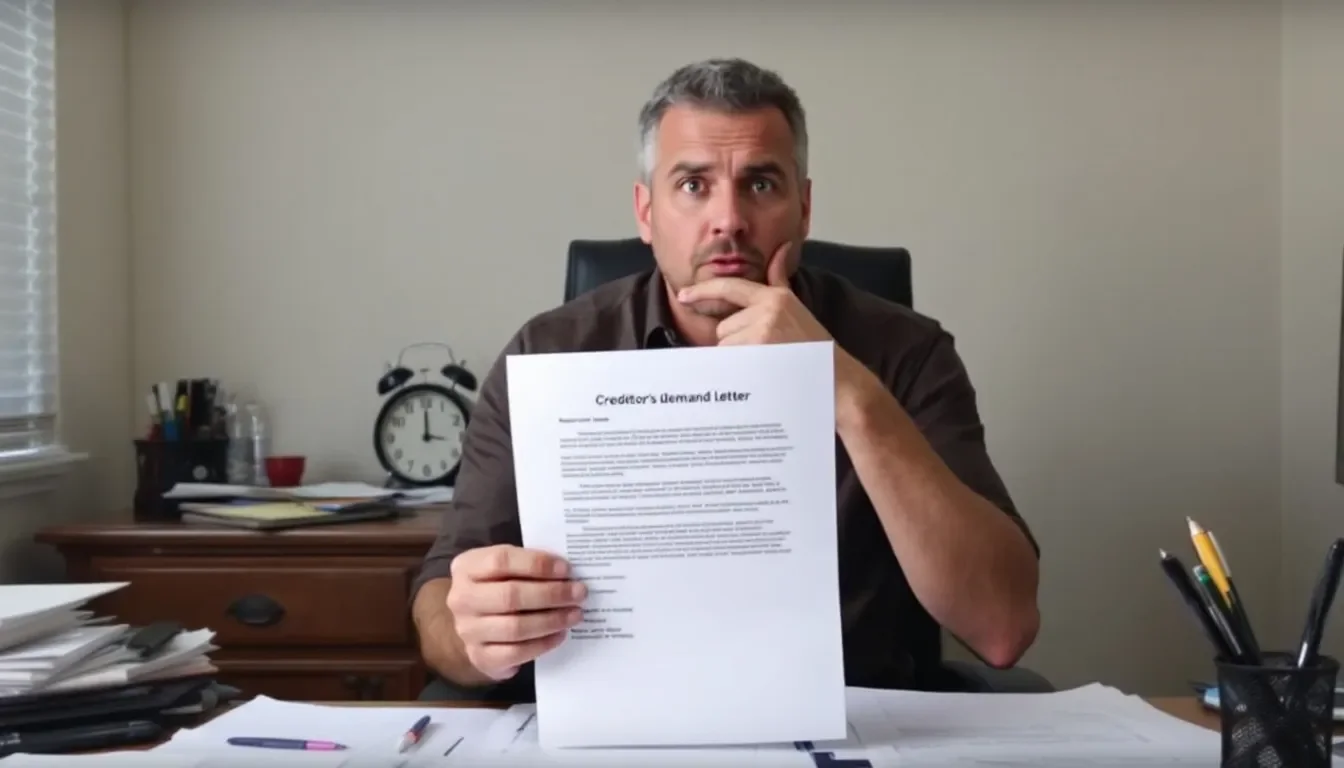Top Strategies: How to Stop Wage Garnishment Without Bankruptcy
Facing wage garnishment and want to avoid bankruptcy? You’re not alone. Many people don’t know that there are effective strategies on how to stop wage garnishment without bankruptcy. This article will explore practical methods such as responding to a creditor’s demand letter, filing an objection with the court, and exploring state-specific remedies. Read on to find out how you can take control of your financial situation.
Key Takeaways
- Swiftly respond to creditor demand letters to potentially stop wage garnishment by negotiating payment plans or settling debts.
- Filing an objection with the court can contest ongoing wage garnishment, but must be done quickly and with proper documentation.
- Utilize available state-specific exemptions and seek professional legal advice to effectively navigate the complexities of wage garnishment.
Responding to Creditor’s Demand Letter

Receiving a demand letter from a creditor requires swift action. Ignoring it can result in automatic wage garnishment. You have several options: pay the debt in full, negotiate a reduced payment, or set up a payment plan, all of which can halt the garnishment process.
A payment plan can be particularly effective, as creditors often prefer voluntary payments over the lengthy and costly garnishment process. Proposing a feasible plan demonstrates your willingness to resolve the debt, potentially halting the garnishment process and buying you time to organize your finances.
Voluntary payments are typically more manageable and can avoid the stress and complications of wage garnishment. Open communication and a genuine effort to meet financial obligations can stop a garnishment before it starts.
Filing an Objection with the Court
If wage garnishment has already begun, you still have options. Filing an objection with the court is one effective method. This involves submitting the necessary forms to formally contest the wage garnishment order. Act quickly, as the timeframe to file an objection is typically between 5 to 30 days after receiving the notice.
Your objection must be detailed and specific, including the case number, reasons for objecting, and contact information. If the garnishment papers lack an objection form, request one from the court clerk or create your own. Prompt filing is crucial to retain your right to contest the garnishment.
At the garnishment hearing, you’ll present your case, challenging the garnishment based on specific exemptions or legal reasons. Bring supporting documents like pay stubs to strengthen your case if based on income exemptions. Successfully contesting the garnishment can result in a court order stopping the process.
Exploring Florida State-Specific Remedies
State laws vary, and Florida offers specific remedies to stop wage garnishment. One notable protection is the head of household exemption, which applies if you financially support a dependent. This exemption can shield your wages from garnishment, allowing you to meet your family’s needs.
Another unique protection in Florida is “tenancy by the entirety,” which can shield joint Bank Account of married couples from garnishment. Understanding these state-specific protections can significantly impact your ability to stop wage garnishment.
Consult local courts or attorneys familiar with Florida’s laws for tailored advice. They can offer valuable insights into specific remedies and help you navigate the legal landscape effectively.
Challenging the Underlying Judgment
Challenging the underlying court judgment that led to wage garnishment can sometimes be the best approach. This requires a thorough understanding of local laws and solid evidence. Grounds for challenging the garnishment include incorrect amounts, improper procedures by creditors, or debts not actually owed.
Challenging the garnishment order in court can immediately halt the process. If improperly served in relation to the judgment, file a separate motion to dispute it. The process for vacating a judgment involves filing a motion, posting a bond, and attending a hearing.
Act promptly, as there are time limits for challenging a judgment. Seek legal advice before taking action; a local attorney can guide you through the process and help verify debt ownership through court or employer documents.
Utilizing Debt Counseling Services

Nonprofit credit counseling agencies can be a lifeline for those facing wage garnishment, providing guidance and support to manage consumer debt effectively. They can negotiate tailored repayment plans to help you avoid wage garnishment.
Participating in a debt management program can be particularly beneficial. Regular debt payments often prompt creditors to halt wage garnishment proceedings. This approach provides immediate relief and helps you regain control of your financial obligations.
Working with a credit counselor can result in more manageable payment plans tailored to your financial circumstances. Leveraging their expertise can help you find a path to financial stability and debt relief.
Negotiating Directly with Creditors
Negotiating directly with your creditors is one proactive way to stop wage garnishment. Open communication can help you arrange smaller monthly payments or a debt settlement. Demonstrating a genuine effort to resolve the debt often encourages creditors to negotiate more favorable terms.
Settling the debt with a lump sum payment will end the wage garnishment. This can be particularly effective if you have access to funds for a one-time payment. Even if a lump sum isn’t possible, negotiating a payment plan that fits your financial situation can prevent wage garnishment.
Direct negotiation with creditors is crucial to preventing wage garnishment and can lead to better financial outcomes. Showing a commitment to repaying the debt often helps find a solution that works for both parties.
Claiming Exemptions
Wage exemption laws ensure individuals retain a portion of their income for living expenses, even during garnishment. These exemptions protect wages based on income level and personal circumstances, such as supporting dependents or facing economic hardship.
Certain types of income, like Social Security or child support, are generally protected from garnishment. To file for an exemption, submit a specific form to the court that issued the garnishment order. If your property has been wrongfully taken, filing a Claim of Exemption can help reclaim it.
If your Claim of Exemption is denied, you have the right to appeal. State laws dictate how much of your wages can be garnished. Understanding the Florida Claim of Exemption process and laws can provide specific guidance for residents.
Long-Term Financial Strategies
Developing long-term financial strategies is crucial to avoid future wage garnishments. Many nonprofit credit counseling agencies offer personalized budgeting advice to help regain financial stability. Creating a comprehensive budget allows you to assess finances, reduce unnecessary expenses, and allocate funds for essentials.
Consider using the Debt Avalanche or Snowball Method for effective debt repayment post-garnishment. Focus on repaying high-interest debts first to minimize overall interest costs and expedite financial recovery. Avoid high-cost loans to prevent falling into another debt cycle.
Regularly reviewing your financial progress can help you stay motivated and adjust budgeting strategies as necessary. Successful credit counseling can enhance financial confidence, enabling more effective debt management.
When to Consider Bankruptcy as a Last Resort

While alternatives to bankruptcy are preferable, sometimes filing for bankruptcy is necessary. It is the most effective way to stop wage garnishment immediately. Understanding state exemption laws can help determine the amount of income you can keep during bankruptcy.
No upfront payment is required to file a bankruptcy case at Debt Stoppers, making it viable for those facing severe financial hardship. However, understand the implications of bankruptcy and make an informed decision based on your financial situation.
Getting Professional Help
Consulting a legal expert is advisable to understand your rights and options before responding to a demand letter. Ziegler Diamond Law, a highly recommended firm, can assist with debt collection lawsuits and bankruptcy, offering complimentary consultations to explore your options.
Seeking professional help can help you regain control of your financial situation and potentially stop wage garnishments. Acting quickly and decisively is key to finding a solution that works for you.
Summary
Stopping wage garnishment without bankruptcy is possible with the right strategies. From responding to creditor demand letters and filing objections with the court, to exploring state-specific remedies and negotiating directly with creditors, there are multiple paths to financial stability. Utilizing debt counseling services, claiming exemptions, and developing long-term financial strategies can help you regain control of your finances. Remember, bankruptcy should be a last resort, but professional help is available to guide you through every step of the process.
Frequently Asked Questions
What should I do if I receive a creditor’s demand letter?
It is crucial to respond promptly to a creditor’s demand letter by either paying the full debt, negotiating a reduced payment, or establishing a payment plan to avoid potential wage garnishment. Taking action can help protect your financial situation.
How can I file an objection to wage garnishment?
To file an objection to wage garnishment, prepare and submit the required forms to the court on time, clearly detailing the case number and your reasons for the objection. Ensure all documentation is accurate and complete to strengthen your case.
Are there specific protections in Florida against wage garnishment?
Yes, Florida has specific protections against wage garnishment, including a head of household exemption and “tenancy by the entirety” provisions. For personalized guidance, it is advisable to consult local courts or legal professionals.
How can debt counseling services help with wage garnishment?
Debt counseling services can effectively negotiate repayment plans and provide strategies to prevent wage garnishment, helping you regain control over your finances. By working with a nonprofit credit counseling agency, you can find more manageable payment solutions tailored to your situation.
When should I consider filing for bankruptcy to stop wage garnishment?
Filing for bankruptcy is the most effective immediate solution to stop wage garnishment, but it should be considered only as a last resort after consulting with a legal expert to understand its implications.


